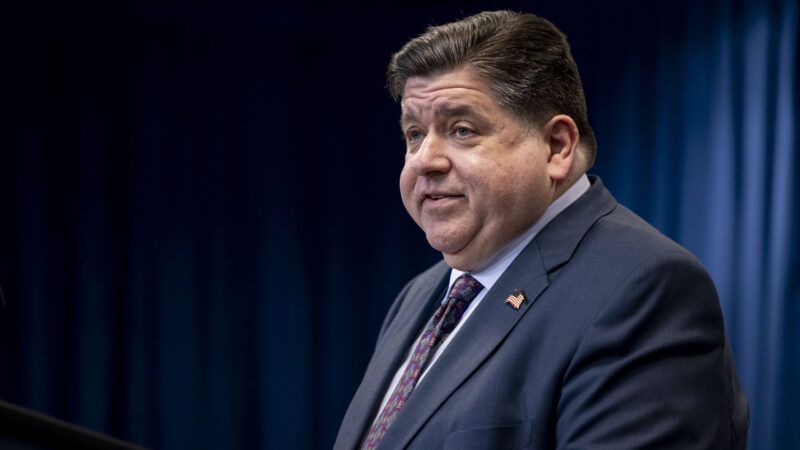Illinois' Sports Betting Tax Means All Bets Are Off
Does Gov. J.B. Pritzker think this helps his presidential profile?

As the sports betting industry explodes in popularity, Illinois is set to slow its momentum.
As part of a $55.2 billion state budget package full of tax hikes, Illinois lawmakers passed a new tax on online sports wagering. Under the guise of filling a roughly $1 billion shortfall, the move imposes a new per-wager tax of 25 cents on the first 20 million online sports bets each fiscal year, doubling to 50 cents per bet after.
Gov. J.B. Pritzker, a Democrat, signaled he would sign the budget but made it all about national politics. "Even in the face of [President Donald] Trump and Congressional Republicans stalling the national economy," Pritzker remarked in a press release, "our state budget delivers for working families without raising their taxes while protecting the progress we are making for our long-term fiscal health."
Illinois has the second-largest sports betting market in the country; the state stands to lose a great deal by imposing this tax. Sports betting stocks nosedived shortly after the budget's passage. FanDuel has already announced a new 50-cent transaction fee is coming to each bet, starting September 1. DraftKings "anticipates taking action" soon.
As Pritzker tries to form a presidential profile, he's sabotaging a booming industry for a political gamble that won't pay off.
In 2019, the Illinois Sports Wagering Act legalized sports betting and removed barriers that had previously forced bettors into the black market or offshore sites. At the same time, major national brands like DraftKings and FanDuel quickly partnered with local casinos to diversify the landscape. Residents also gained access to online and mobile platforms that optimized user experiences. Newfound cooperation and innovation led to a lucrative venture that benefited all involved.
Ingenuity led to the state's total sports wagers exceeding $14 billion in 2024, marking a 20.7 percent increase from 2023, when the handle was $11.62 billion. February 2025 revenue jumped 53.1 percent year-over-year, driven by a favorable Super Bowl outcome for operators, and March 2025 witnessed a 34.7 percent year-over-year increase in dollars compared to March 2024.
Pritzker and colleagues see this tax as getting a slice of a pie that keeps growing—after all, sportsbooks generated $1.2 billion in state revenue in 2024, up from $1 billion in 2023.
But in 2024, the state slapped sportsbook companies with tax rates up to 40 percent. Illinois had a flat tax of 15 percent on gross gaming revenue before that, and residents already paid income tax on their winnings. Shifting so rapidly to the new system isn't a move toward affordability or fiscal responsibility; it's another step in an aggressive campaign to intrude on independent enterprise.
The Pritzker administration contends that these taxes contribute to state needs like education. There are other ways of funding these sectors that don't involve taxing, such as recouping surplus funds from tax increment financing districts, but priorities lie with tax hikes. Lawmakers have opted instead to force betting operators to suffer a competitive disadvantage.
Illinois is now the second-most expensive state for sportsbook operations, only behind New York. To offset the new costs, companies may halt promotions and bonuses for bettors, making legal betting less attractive compared to previous years. Analysts estimated that DraftKings alone would've paid an extra $68 million in taxes had this structure existed last year. They expect operators to pass these increased costs onto customers through worse odds and higher fees.
The per-bet tax will also disproportionately impact small, recreational bettors who are the majority base for operators. With higher burdens and fewer incentives, bettors may turn to unregulated, illegal sportsbooks that don't pay taxes or provide customer protections—the same ones Illinois tried quashing in 2019 with legalization.
With Pritzker's presidential ambitions known, he's carving out a unique lane for a 2028 campaign. He will twist the narrative as fiscal stewardship that raises millions and populism that compels big business to contribute more. But consumer welfare shouldn't be secondary to political aspiration. Further, invasive policy shouldn't be the role model other states adopt with sports betting. Doing so neglects local priorities, erodes public trust, and misses opportunities for structural reform.


Show Comments (31)